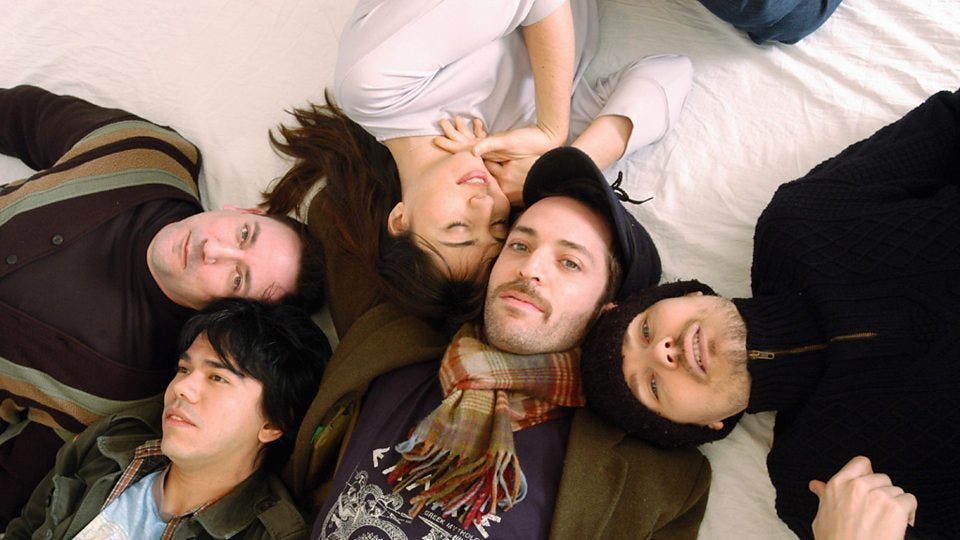Zwan's "Mary Star of the Sea" at 20
Billy Corgan's declaration of faith was short-lived, but it still stands as the most optimistic and energetic of any of his projects.

In 2002, Billy Corgan’s world was no longer a vampire. Instead, the Smashing Pumpkins’ singer/guitarist declared his faith with a new rock supergroup named Zwan.
Though the band’s debut was released unceremoniously in late January 2003, Mary Star of the Sea is the happiest Corgan has ever sounded. If he seemed excited, you couldn’t blame him based on the band’s pedigree alone. Corgan organized a roster of alt-rock all stars, complete with fellow Pumpkins drummer Jimmy Chamberlain, Chavez guitarist Matt Sweeney, Slint guitarist David Pajo, and former A Perfect Circle/current Pixies bassist Paz Lenchantin. What could go wrong?
Honestly? Everything did, and a beloved Corgan side project remains noticably unavailable on digital service providers (DSPs) like Spotify, Apple Music, et. al.
By September 2003, the band broke up before a world tour. As of 2017, Sweeney was still unpacking how it all went down, telling a New Zealand music outlet that he signed confidentiality agreements. In 2018, Pajo compared Corgan to Donald Trump. In 2005, ahead of a new solo album, Corgan told the Chicago Tribune that Zwan was done before it began. Corgan blamed other band members’ sex, drugs and rock ‘n’ roll lifestyles. Zwan’s behind the scenes drama included rumors of heroin use, affairs, jealousy, and Corgan’s controlling tendencies. The stories eerily parallel the Pumpkins’ demise post-Mellon Collie and the Infinite Sadness.
Mary Star of the Sea debuted at No. 3 on the Billboard Top 200 Albums chart and sold around 200,000 copies before the band called it quits. On paper, Corgan’s power-pop swing seems like a whiff. To this day, the music is unexpectedly great even if Corgan’s then-newfound faith sounds off-putting.
Sweeney initiated the band in 2001, writing a batch of songs with Corgan. Soon, they had hundreds of tunes. Near the Key West, Florida music space where the band rehearsed was a church named Mary Star of the Sea. Corgan wrote that he prayed to the Virgin Mary at that church. That faith went into Corgan’s lyrics as he found a chance to be reborn with Zwan.
Listening today, Zwan’s lyrics are as cringeworthy as Corgan’s ‘90s lines that reference empty, childhood birthday parties, or the “kaboom” misogyny of “X.Y.U.” On “Settle Down,” Corgan proclaims, “Whatever I can do, I will/’Cuz I’m good like that.” On the title track, he moans, “Jesus, I’ve taken my cross.” With all the illusions to Christ, Zwan sounds like a contemporary Christian rock band. When Corgan isn’t laser-focused on his faith, he’s in his bag, writing pop-rock love songs like “Honestly,” “Of a Broken Heart,” and “Come With Me.” This trio of tunes is generic, but far more believable compared to the rest of these Catholic pamphlets.
If you tune out the Joseph and the Amazing Technicolor Dreamcoat vibes, Mary Star of the Sea is a great rock record. Chamberlain is drumming his ass off from measure one, crushing single-stroke rolls and paradiddles all over “Lyric” and “Ride a Black Swan.” (Sorry for the technical terms here, I’m a drummer. When I was a high school sophomore, I zoned out to Chamberlain’s drumming here, trying to replicate his fills. Other drummers like Neil Peart or John Bonham, but it was more impressive to me that Chamberlain was in this side project, whooping everyone’s ass and nearly covering for Corgan’s Christianity.)
True to Corgan’s past outlets, it’s difficult to differentiate any guitar work between the players. However, the hooks are everywhere from the tremolo build on “Lyric” to that whirring mid-range attack on “Ride a Black Swan.” Fans of Corgan’s trademark fuzz from the Pumpkins’ glory days will eat up the solos at the end of the title track as well as the main hook from “Settle Down.”
More to the point, Zwan’s energy demands your attention. Aesthetically, Mary Star of the Sea is a complete 180 from the absinthe-drinking vibes of Adore and Machina/The Machines of God. Hell, the band is even smiling in press photos and music videos. On record, when Zwan isn’t sounding like it’s flying through heaven on a winged thing, there’s a casual feel on tracks like “Yeah” and “Baby, Let’s Rock” that’s more fun than any of Corgan’s past theatrics.
On another low-key winner, “El Sol,” Corgan sings, “Sunshine and some tea/That’s all I wanted.” Corgan could always write this type of pop-rock. The type of song where you’ll catch yourself rolling your eyes at the cringe sentiments, but you give into the melodies, fuzz and (in most cases) Chamberlain’s amazing drumming chops.
Like most of Corgan’s work post-Mellon Collie, the turn didn’t stick. We can speculate on why and how Zwan broke up, but it’s odd that Mary Star of the Sea is nowhere to be found on DSPs. Maybe Corgan is embarrassed about Zwan, which would be strange considering everything he’s released since Mary Star of the Sea. His 2005 solo album was another retreat into drum machines. Then came the return of the Pumpkins with a new lineup (one album titled Zeitgeist is also strangely absent from DSPs), then the old lineup sans-D’arcy, then Tommy Lee played drums, then the old lineup again. There were songs written with Taproot, dalliances with wrestling, and multiple cover appearances on a Chicago cat rescue magazine. Every two years or so, Corgan pops up with something. This year, it’s the three-act rock opera titled Atum.
Honestly? It all pales in comparison to Zwan.




